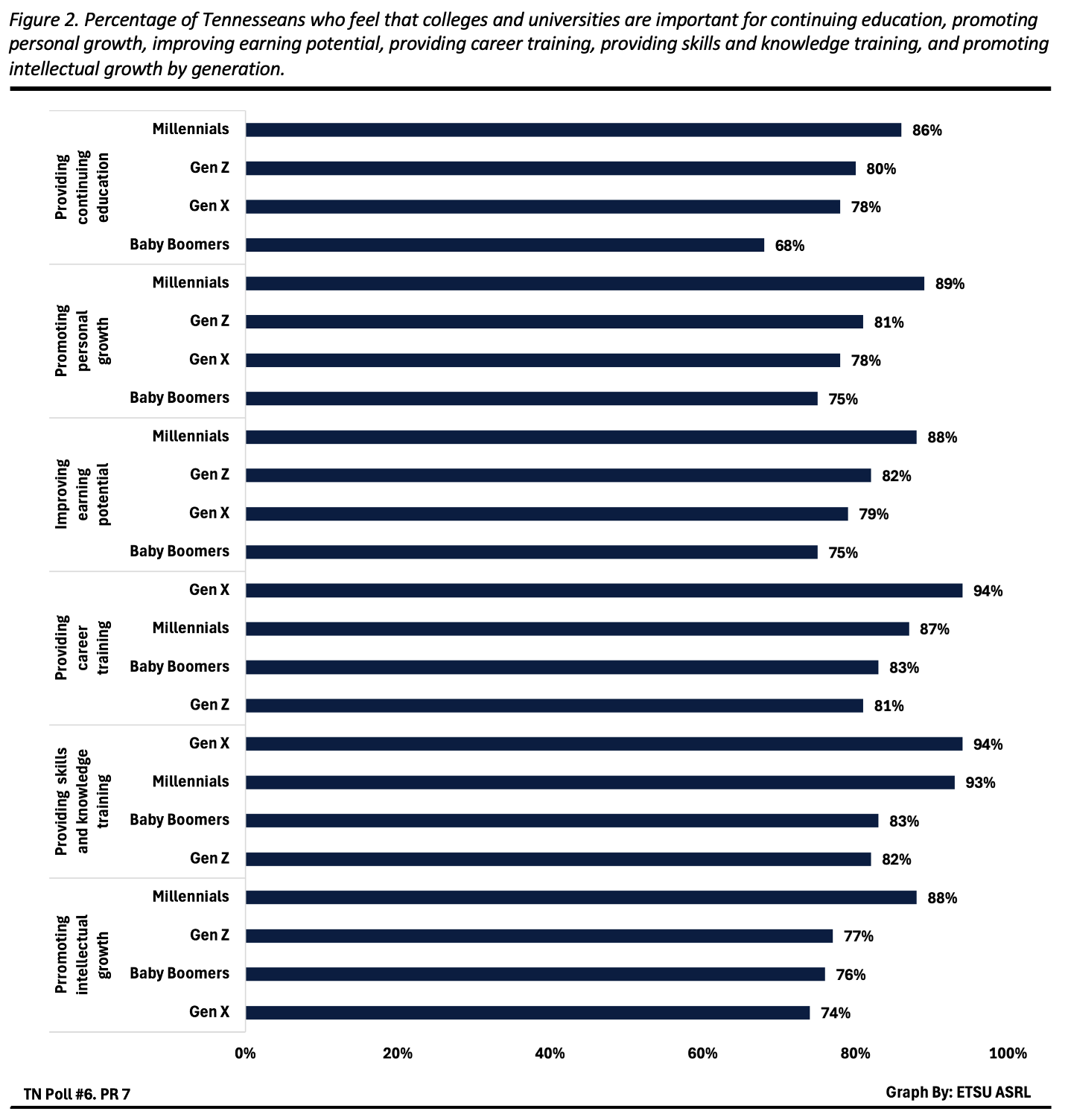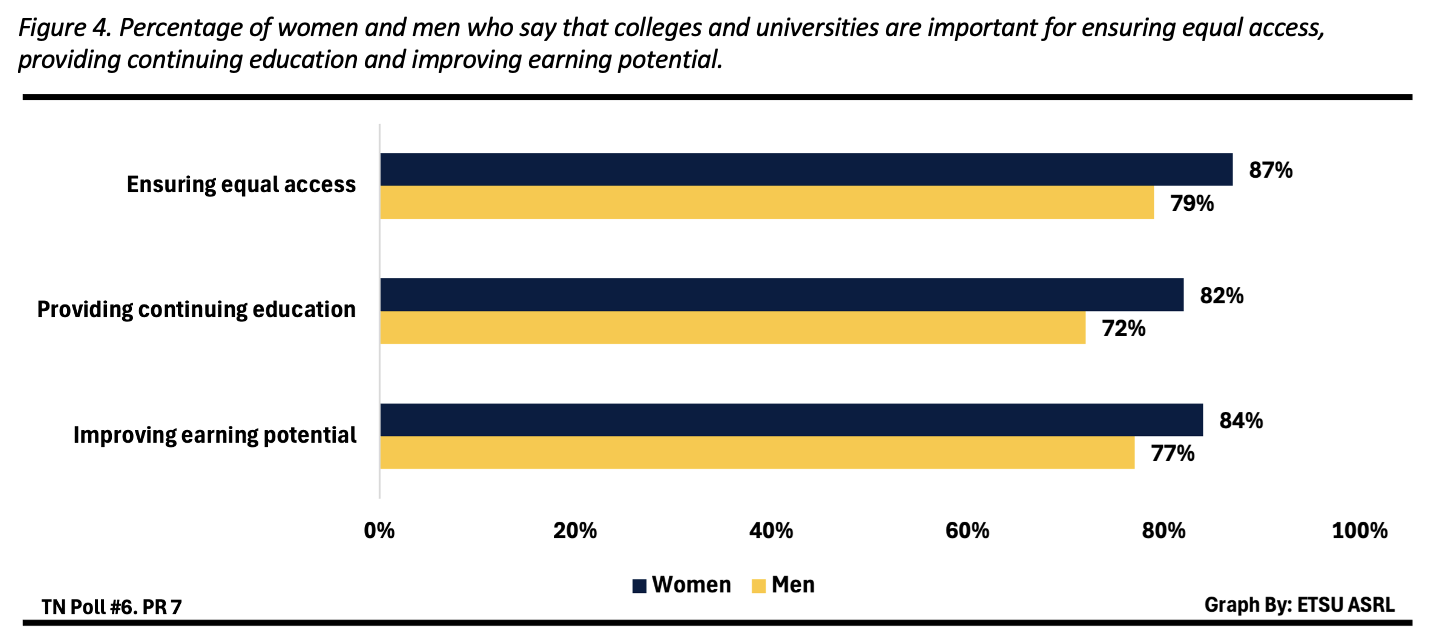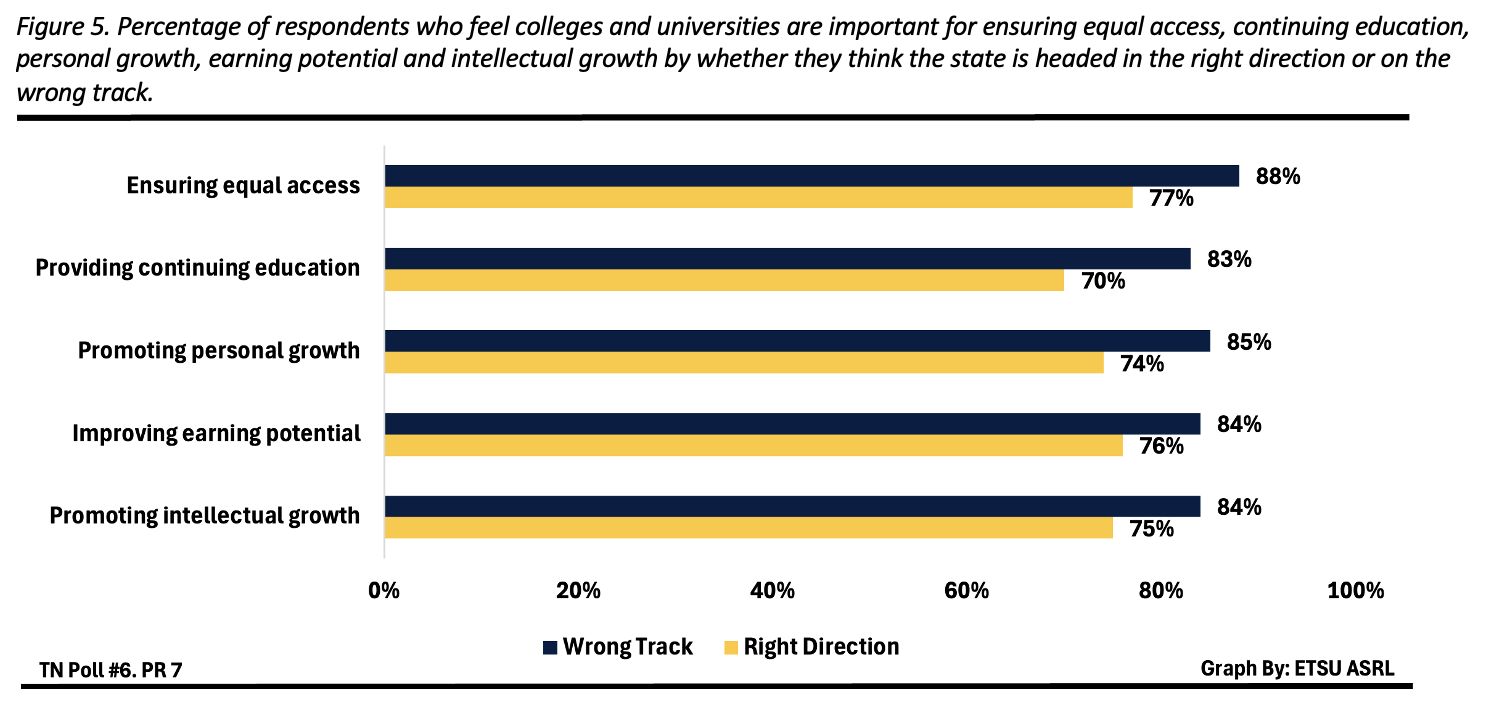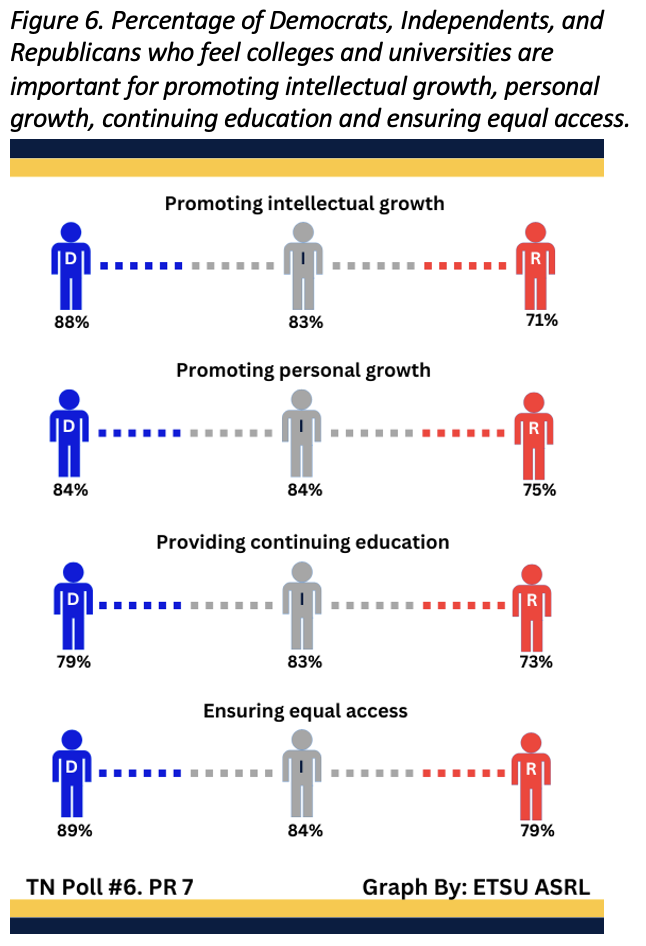Tennesseans validate the importance of higher education
Tennesseans value the importance of higher education, according to The Tennessee Poll, conducted in July by the Applied Social Research Lab (ASRL) at East Tennessee State University, which found that 45% of Tennesseans believe that a college education is very important or extremely important in “helping a young person succeed in the world today.” That figure is compared to 41% who indicated that a college education is “somewhat important” and 14% who indicated it is “not too important.”
Among the issues of interest was the view of Tennesseans on the role of colleges and universities. Survey respondents were asked, “Thinking about the role that colleges and universities play in the lives of their students, how important, if at all, is it that colleges and universities do each of the following?” and then provided with seven roles:
- Provide a broad-based education that promotes intellectual growth (herein promotes intellectual growth),
- Provide skills and knowledge that will be of general value in the working world (herein provides skills and knowledge),
- Provide training for a specific career or profession (herein provides career training),
- Help students improve their future earning potential (herein improves earning potential),
- Promote personal growth and maturity (herein promotes personal growth),
- Provide continuing education for adults of all ages (herein provides continuing education), and
- Ensure that all qualified students have equal access to a college education (herein ensures equal access).
For each of these roles, respondents were asked whether this aspect was extremely important, important, somewhat important, or not too important.
Overall, Tennesseans are supportive of all these roles of colleges and universities (See figure 1), with an average of 8 in 10 Tennesseans viewing each role as important or extremely important. Importance ranged from 77% for providing continuing education to 88% for providing skills and knowledge.

Despite the overwhelming belief that these are all important roles of colleges and universities, ASRL researchers noted differences across respondent demographics. These differences, however, are not consistent across the seven objectives. The most consistent difference was in the generation of the respondent. See figure 2. Millennials were the most likely to support promoting intellectual growth (p=.004), improving earning potential (p=.006), promoting personal growth (p=.004) and providing continuing education (P<.001) as important roles of colleges and universities. Generation Xers, on the other hand, were the most likely to support providing skills and knowledge (p<.001) and providing career training (p=.003) as important roles of colleges and universities. No generational differences were observed for the importance of providing equal access.

Interestingly, education did not play a role in Tennesseans’ perceptions of these roles, but the ASRL did note differences in income for the role of colleges and universities in promoting personal growth (p=.033). More specifically, respondents earning between $50,000 and $100,000 annually (84%) were more likely to see this role as important than those earning less than $50,000 (83%) or those earning more than $100,000 (75%). Additionally, educators (94%) within the sample were more likely than non-educators (80%) to think colleges and universities should improve students’ future earning potential (p=.042).
Regarding race, ASRL researchers observed a difference in views on the importance of colleges and universities in promoting personal growth (p=.048) and ensuring equal access (p=.003), in which Black respondents view these roles as more important than White respondents or respondents of another race. See figure 3.

Female respondents were more likely than males to note the importance of colleges and universities in improving earning potential (p=.029), providing continuing education (p=.001) and ensuring equal access (p=.004), but the respondents' number of children (under 18) was only significant for importance of providing continuing education (p=.015). For “provide continuing education for adults of all ages,” respondents without children (74%) were less likely than respondents with children (84%) to see this role as important or extremely important. See figure 4.

There was a notable relationship among Tennesseans between political beliefs and views on the roles of colleges and universities. Respondents who believe that Tennessee is “on the wrong track” consistently assigned greater importance to the roles of colleges and universities than those who believe that Tennessee is “heading in the right direction.” See figure 5.

As discussed in the first press release of the 2024 Tennessee Poll results, this is likely due to the relationship between perceptions on the direction of Tennessee and political leaning. For instance, ASRL noted a difference in perceptions of the importance of promoting intellectual growth (p<.001) in which Democrats (88%) viewed this role with higher importance than Independents (83%) and Republicans (71%). See figure 6.

This is the seventh in a series of data releases from The Tennessee Poll. We provide methodological information, margin of error estimates, as well as detailed tables with analysis on each question by different demographic categories. To find these, or to be added to our distribution list, go to etsu.edu/tnpoll. Graphics are provided for press use.
Important Notes:
This press release was originally due to be released on Nov. 8. Due to the devastating impact of Hurricane Helene on our community, we delayed the release series. We at the Applied Social Research Lab ask that you keep our impacted Tennessee, North Carolina and Virginia communities in your thoughts. The toll on our communities has been profound, and your support can make a difference. To learn how you can help, visit the ETSU Response page, “Bucs Rebuild Together.”
About the Tennessee Poll
The Tennessee Poll is conducted by the Applied Social Research Lab (ASRL) in the Department of Sociology and Anthropology at East Tennessee State University. ASRL is directed by Dr. Kelly N. Foster, professor of sociology.
The Tennessee Poll is an annual public opinion poll funded by ETSU. The mission of The Tennessee Poll is to provide the citizens and governance of Tennessee with neutral, unbiased information on Tennesseans’ perceptions of issues that impact their health, education, and quality of life.
Though the project has been internally funded to date, there exists the possibility of outside researchers or organizations being given the option to purchase space for questions on future polls. Should this occur, any and all funding sources will be noted in the methodology report for that particular poll.
The Applied Social Research Lab is a member of the Association of Academic Survey Research Organizations (AASRO) and adheres to the reporting requirements of the American Association for Public Opinion Research Transparency Initiative standards in research reporting.
For detailed information on The Tennessee Poll, including methodology and additional analysis, visit etsu.edu/tnpoll.
About the Authors
This press release was prepared by Drs. Candace Bright Hall-Wurst, Trena Paulus and Kelly N. Foster. Graphics prepared by Ms. Morgan Jones Kidd and M. Rebecca Strasser. For information and biographies on the contributors to this release, see etsu.edu/asrl.
East Tennessee State University was founded in 1911 with a singular mission: to improve the quality of life for people in the region and beyond. Through its world-class health sciences programs and interprofessional approach to health care education, ETSU is a highly respected leader in rural health research and practices. The university also boasts nationally ranked programs in the arts, technology, computing, and media studies. ETSU serves approximately 14,000 students each year and is ranked among the top 10 percent of colleges in the nation for students graduating with the least amount of debt.
Stay in Touch
Follow ETSU on Social
 Stout Drive Road Closure
Stout Drive Road Closure